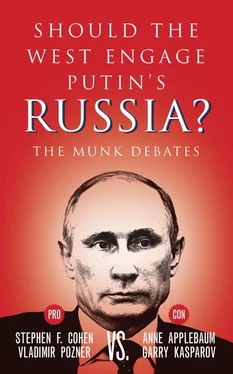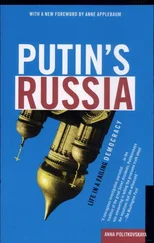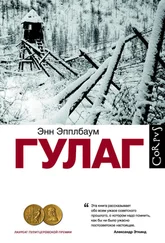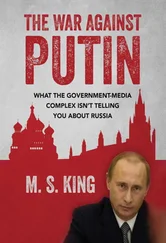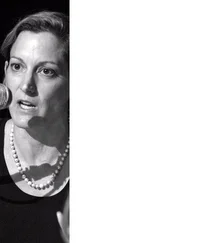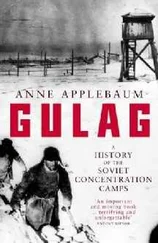Times, as they always do in international affairs, have changed dramatically. We seem to be in the midst of a new Cold War with Russia, all of which made for important fodder for the latest Munk Debate at Roy Thomson Hall last Friday night. It was the fifteenth such debate in a series that has brought together the brightest minds and sharpest thinkers. This evening’s participants were former Soviet broadcaster Vladimir Pozner and New York University Russian studies professor Stephen F. Cohen, who argued that more engagement with Russia will ensure a more secure West. Former chess champion Garry Kasparov and author/journalist Anne Applebaum urged more isolation and a tougher line against rogue dictator Vladimir Putin.
“Isolating any country is not only counterproductive but dangerous, especially if the country is as big, as wealthy, as powerful, and as unpredictable as Russia,” warned Pozner, who seemed to blame a lack of recognition and engagement by the West for the Soviet system developing as it did, and for the millions of starving Ukrainians and the Soviet occupation of eastern Europe. To the astonishment of his debate opponents, Pozner insisted that if the West’s policy hadn’t been aimed at humbling a nation of proud people, Russia would be a different country today.
Russia’s current leaders own the nation, countered Applebaum. They control everything through “theft, graft, and money laundering.” She explained that 110 people control 35 percent of the country’s wealth, essentially making it a mafia state. We must make Putin pay a high price so he doesn’t invade another neighbour, she declared.
Stephen F. Cohen admonished his opponents by quoting former New York senator Daniel Patrick Moynihan: “You’re entitled to your own opinions, but you’re not entitled to your own facts.” “These are the facts,” Cohen proceeded. “In this globalized world, it is impossible to isolate Russia. Russia is too big, too rich, too interconnected.”
Cohen noted that even with the West’s deteriorating relationship with Russia, Putin has signed more economic, political, and military agreements with the rest of the world than America has. Isolating Russia hasn’t made them more compliant, it’s made them turn elsewhere, he said. A further destabilized Russia will be worse.
Kasparov, who lives “in exile” in Manhattan, spoke of his “dream” coming true in 1991, when the Soviet Union died without any of the bloodshed seen in the Balkans with the disintegration of the former Yugoslavia. The West invested billions of dollars in Russia. And then Putin came in, restored the old Soviet national anthem, and turned the country into a one-man dictatorship, he said. Kasparov tried his hand at politics but found the deck completely stacked against his opposition forces, who were denied access to media and fundraising. “In chess we have fixed rules and an unpredictable result,” he said. “In Putin’s Russia, it’s the exact opposite.”
Henry Kissinger wrote that the demonizing of Putin is not a policy, argued Cohen.
Applebaum countered that the West tried engagement and it hasn’t worked. “Presidents Clinton and Bush invited Russia to join the G8,” she said, noting that we did engage and invite Russia into our institutions and their response was to invade Chechnya, Georgia, and Ukraine.
Kasparov wanted to come back to an earlier point. “This is the first time I’ve heard someone suggest that a policy of engagement in the 1920s could have prevented Stalinist terror,” he said incredulously. “Lenin said, ‘We’ll treat the West as useful idiots who’ll sell us the very rope that we’ll use to hang them.’”
As in most Munk Debates, there were also moments of comedy, even though the topic was deadly serious. As Kasparov’s temperature rose and he became more and more animated, Pozner asked, “Why are you yelling at me?”
“That’s how he always talks,” said Applebaum.
“Because I am also Russian,” replied Kasparov.
Comic relief aside, Applebaum went on to describe Russia as a virulently anti-American country, thanks to a non-stop bombardment of anti-American propaganda in the Russian media.
Cohen wasn’t buying: “I read ten Russian newspapers every day,” he said, conceding that what Applebaum said was true for three of them, but not for the other seven.
“How many Ukrainian newspapers do you read?” Applebaum shot back.
“I read ten Russian newspapers every day,” was all Cohen could muster before turning to another point.
We expanded NATO toward their borders, Cohen continued. “We were continuously warned by liberal Russians — people we liked in Russia — that we were pushing too far.”
Central Europeans wanted to be in NATO, said Applebaum. “The United States very reluctantly agreed to expand the security zone so that the people — all 100 million of them — would be able to transition to democracy and begin economic development and growth without fear of invasion. And it worked. It’s been unbelievably successful.”
But Cohen insisted those moves to include central or eastern European countries in NATO violated an agreement America made with the former Soviet Union.
“James Baker, the then U.S. secretary of state, expressed to [Gorbachev] that if they agreed to the unification of Germany and took down the Berlin Wall, NATO would not move one inch to the east.” Cohen went on to say that the wall did indeed come down — and then America abrogated the agreement by admitting Poland and the Czech Republic into NATO, claiming that the agreement had been with the Soviet Union, not Russia.
Pozner concluded the night with a David Letterman–style Top Ten list of reasons not to isolate Russia, including that it would only embolden the chauvinists, turn Russia toward the East (including China), make Russia more unpredictable, and lead to a new generation of Russians who are hostile to the West.
As with all Munk Debates, the audience of 3,000 was invited to vote twice: once at the beginning of the night, then again after hearing the competing arguments. When the night began, 58 percent agreed that more engagement and less isolation of Russia was the way to go, while 42 percent disagreed. After a spirited debate, only 48 percent wanted more engagement, while 52 percent urged for more isolation. The con side moved more votes, and thus carried another fascinating night at Roy Thomson Hall.
Steve Paikin is anchor of The Agenda with Steve Paikin on TVO.
The Munk Debates are the product of the public-spiritedness of a remarkable group of civic-minded organizations and individuals. First and foremost, these debates would not be possible without the vision and leadership of the Aurea Foundation. Founded in 2006 by Peter and Melanie Munk, the Aurea Foundation supports Canadian individuals and institutions involved in the study and development of public policy. The debates are the foundation’s signature initiative, a model for the kind of substantive public policy conversation Canadians can foster globally. Since the creation of the debates in 2008, the foundation has underwritten the entire cost of each semi-annual event. The debates have also benefited from the input and advice of members of the board of the foundation, including Mark Cameron, Andrew Coyne, Devon Cross, Allan Gotlieb, George Jonas, Margaret MacMillan, Anthony Munk, Robert Prichard, and Janice Stein.
For his contribution to the preliminary edit of the book, the debate organizers would like to thank Patrick Luciani.
Since their inception, the Munk Debates have sought to take the discussions that happen at each event to national and international audiences. Here the debates have benefited immeasurably from a partnership with Canada’s national newspaper, the Globe and Mail , and the counsel of its editor-in-chief, David Walmsley.
Читать дальше
